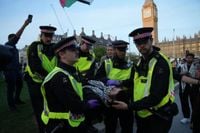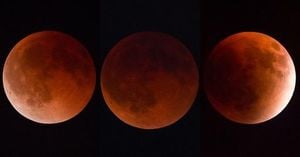In a dramatic escalation of tensions over protest rights in the United Kingdom, nearly 900 demonstrators were arrested in central London on September 6, 2025, during a rally opposing the government’s controversial decision to ban the activist group Palestine Action as a terror organization. The Metropolitan Police described the mass arrests—857 under terrorism laws for showing support for the group and 33 for other offenses, including assaults on officers—as the largest in decades, underscoring the heated debate now gripping Britain over civil liberties, government power, and the boundaries of dissent.
The protest, organized by the campaign group Defend Our Juries (DOJ), saw an estimated 1,500 people gather in Parliament Square, Westminster. Many held signs declaring, “I oppose genocide, I support Palestine Action,” in a visible show of solidarity with the proscribed group. According to CNN, the demonstration was marked by tense scenes as police officers forced their way through the crowds, sometimes drawing batons and clashing with protesters. Video footage verified by the network captured one officer wielding a baton amid a struggle, while others tussled with demonstrators on the ground. Chants of “shame on you” filled the air as officers made arrests, and several protesters—including elderly attendees—were seen being carried away by police.
The Metropolitan Police condemned what they characterized as “intolerable” abuse directed at their officers, with Deputy Assistant Commissioner Claire Smart stating, “The violence we encountered during the operation was co-ordinated and carried out by a group of people, many wearing masks to conceal their identity, intent on creating as much disorder as possible. Many of those individuals have now been arrested and we have begun securing charges.” She contrasted the demonstration with other peaceful protests in London, saying, “You can express your support for a cause without committing an offence under the Terrorism Act or descending into violence and disorder, and many thousands of people do that in London every week.”
However, organizers and supporters painted a starkly different picture. A DOJ spokesperson insisted the rally was “the picture of peaceful protest,” noting that attendees included vicars, priests, war veterans, Holocaust survivors, retired teachers, and healthcare workers—many of them elderly or disabled. “The fact that 857 out of 1,500 were arrested and that this took 11 hours, makes a mockery of the ban on Palestine Action and shows once again that it is impossible to enforce,” the spokesperson said. “Rather than arrest thousands more ordinary citizens…the new Home Secretary must rethink what is becoming Labour’s poll tax moment, which is making the UK the subject of condemnation and ridicule around the world.”
Palestine Action, founded in 2020 by Huda Ammori and climate activist Richard Barnard, has made headlines for its direct actions targeting weapons manufacturers linked to the Israeli government. The group’s activities have included occupying and vandalizing sites operated by Elbit Systems UK, UAV Tactical Systems, and Leonardo, as well as slashing a portrait of former foreign secretary Arthur Balfour at Cambridge and removing busts of Israel’s first president from Manchester University. The government’s move to proscribe the group as a terror organization followed a high-profile action in June 2025, when activists broke into RAF Brize Norton—Britain’s largest airbase—and damaged two Airbus Voyager refueling planes with paint and crowbars.
In July 2025, then-Home Secretary Yvette Cooper designated Palestine Action as a terrorist organization, placing it on the same legal footing as Hamas, al Qaeda, and ISIS. The ban, which makes supporting the group punishable by up to 14 years in prison, was justified by the government on the grounds that Palestine Action had crossed the line from protest to sabotage. Cooper argued the move was necessary to safeguard national security, stating the group “is not a non-violent organization” and has a history of “unacceptable criminal damage.” The government cited an assessment from the Joint Terrorism Assessment Centre, but has not provided public evidence that Palestine Action used weapons or caused serious injury.
The designation has sparked a fierce backlash from civil liberties campaigners, human rights groups, and international observers. Amnesty UK condemned the move as “a disturbing legal overreach,” arguing that existing laws could address property damage without resorting to terrorism legislation. UN human rights chief Volker Turk called for the ban to be lifted, warning that it risks hindering legitimate protest and free expression. “There is a clear danger that it will be used against other groups the government of the day does not like—whether that be racial or climate justice groups, disability rights groups or trade unions,” a Defend Our Juries spokesperson said to CNN.
Since the ban, more than 1,500 individuals have been arrested at solidarity protests across the UK. On August 9, 2025, over 500 people were arrested in London alone—nearly half of them aged 60 or older, with almost 100 in their 70s and 15 in their 80s. Justice Minister Alex Davies-Jones told the BBC that “anyone showing support for that terrorist organization will feel the full force of the law.” Protests have also erupted in Belfast and Edinburgh, where Police Scotland reported the arrest of two men, aged 67 and 82, on terror charges and a third man, 63, on a hate crime charge after demonstrations on September 6.
As public support for overturning the ban has grown, the government has doubled down. Defence Secretary John Healey said on Sky News’s Sunday Morning With Trevor Phillips that new Home Secretary Shabana Mahmood would be “just as tough” on Palestine Action as her predecessor, Yvette Cooper, who became Foreign Secretary following a Cabinet reshuffle on September 5. “If we want to avoid a two-tier policing and justice system in this country, when people break the law, there have to be consequences,” Healey said. “That’s what was happening yesterday.” He also acknowledged the widespread anguish over events in Gaza but insisted that support for Palestine Action was not required to protest those concerns.
Palestine Action’s co-founder Huda Ammori has rejected the government’s claims as “plainly defamatory,” stating, “The Government has failed in any way to support its false claim that Palestine Action was planning some kind of violence in the future. As the minister of defence should be well aware, the Government’s own intelligence assessment said Palestine Action did not advocate violence nor glorify it.” Ammori has indicated she is seeking legal advice about pursuing a defamation claim against the government.
The legal battle over the ban is far from over. A judicial review is scheduled for November 2025, after High Court Judge Martin Chamberlain ruled it “reasonably arguable” that the proscription disproportionately interferes with rights to freedom of expression, assembly, and association under the European Convention on Human Rights. The Home Office is appealing the court’s decision to allow Ammori’s legal challenge to proceed, signaling a protracted fight ahead.
For many, the events of September 6 have become a flashpoint in the national conversation about protest, policing, and democracy. Whether the government’s tough stance will endure—or if the courts will force a rethink—remains to be seen. But as the debate continues, the eyes of the world are firmly fixed on Britain’s Parliament Square.




